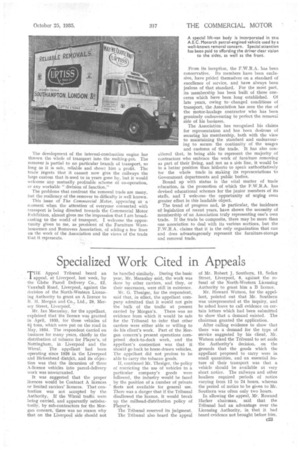Specialized Work Cited in Appeals
Page 65

If you've noticed an error in this article please click here to report it so we can fix it.
TIIE Appeal Tribunal heard an appeal, at Liverpool, last week, by . the Globe Parcel Delivery Co., 52, Vauxhall Road, Liverpool, against the decision of the North-Western Licensing Authority to grant an A licence to R. H. Morgan and Co., Ltd., 29, Mersey Street, Liverpool.
Mr. Ian Macaulay, for the appellant, explained that the licence was granted in April, 1935, for three vehicles of Gi tons, which were put on the road in May, 1934. The respondent carried on business for many years, chiefly in the distribution of tobacco for Player's, of Nottingham, in • Liverpool and the Wirral. The appellant had been operating since 1926 in the Liverpool and Birkenhead distr,ict, and its objection was that the incursion of three A-licence vehicles into parcel-delivery work was unwarranted.
It was• suggested that the proper licences would. be Contract A licences or limited carriers' licences. That .contuition was not accepted by the Authority. If the Wirral traffic were being carried, and apparently 'satisfactorily, by sub-contractOrs for the Morgan concern," there was no reason why that on the Liverpool side should not
be handled similarly. During the basic year, Mr. Macaulay said, the work was done by other carriers, and they, or their successors, were still in existence.
Mr. G. Thesiger, for the respondent, said that, in effect, the appellant company admitted that it would not gain the bulk of the traffic at present
carried by IVIOrgan's. There was no evidence from which it would be safe for the Tribunal to infer that other carriers were either able or willing to do his client's work. Part of the Morgan concern's present operations comprised dock-to-dock work, and the appellant's contention was that it should go hack to horse-drawn vehicles. The appellant did not profess to be able to carry the tobacco goods.
If, continued Mr. Thesiger, the policy of restricting the use of vehicles to a particular company's goods were followed, the industry would be faced by the position of a number of private fleets not available for general use. There was a danger that if the Tribunal disallowed the licence, it would break up the railhead-distribution policy of Player's.
The Tribunal reserved its judgment. The Tribunal also heard the appeal
of Mr. Robert J. Southern, 11, Sedan Street, Liverpool, 8, against the refusal of the North-Western Licensing Authority to grant him a B licence.
Mr, Howard Watson, for the appellant, pointed out that Mr. Southern was unrepresented at the inquiry, and he asked leave to call evidence on certain letters which had been submitted to show that a demand existed. The chairman granted the application.
After calling evidence to show that there' was a demand for the type of service suggested by his client, Mr. Watson asked the Tribunal to set aside the . Authority's decision, on the grounds that the goods which the appellant proposed to carry were in small quantities, and an essential feature of their transport was that a vehicle should be available at very short notice. The railways and other hauliers required periods of notice varying from 12 to 24 hours, whereas the period of notice to be given to Mr. Southern was often only two hours.
In allowing the appeal, Mr. Rowand Harker chairman, said that the Tribunal had an advantage over the Licensing Authority, in that it had heard evidence not brought before him.
















































































































































